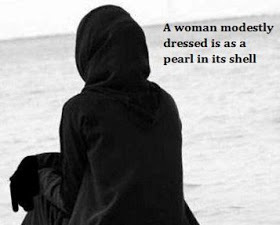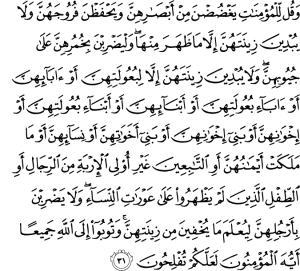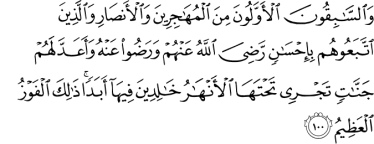Allah سبحانه وتعالى sent down Prophet peace be upon him with complete guidance, one that doesn’t require any addition or subtraction as it has been sent down by the All-knowing, the Ever Wise. One of the most important things that the prophet emphasised upon is Haya (modesty). It is considered a part of Imaan (faith).
Under the topic of haya comes a very important teaching of Islam regarding Muslim women. It’s my dear fellows the covering of the face.
Now there have been many fatwas by prominent scholars calling the wearing of face covering as mustahab, which makes it permissible for women to not cover their faces. As Muslims we follow the teachings of the Qur’an and Sunnah of the Prophet peace be upon him. I thereby feel it my responsibility to enlighten you all about the obligation of wearing the face covering from the Quran and Hadith.
Proof from the Quran
The first daleel comes from surah Noor ayah 31
(And tell the believing women to reduce [some] of their vision and guard their private parts and not expose their adornment except that which [necessarily] appears thereof and to wrap [a portion of] their headcovers over their chests and not expose their adornment except to their husbands, their fathers, their husbands’ fathers, their sons, their husbands’ sons, their brothers, their brothers’ sons, their sisters’ sons, their women, that which their right hands possess, or those male attendants having no physical desire, or children who are not yet aware of the private aspects of women. And let them not stamp their feet to make known what they conceal of their adornment. And turn to Allah in repentance, all of you, O believers, that you might succeed.)
We can conclude from the ayah that Allah سبحانه وتعالى has ordered women to cover their private parts to prevent themselves from becoming rape victims. It’s a taken that a man gets attracted towards a woman because of the beauty of her face, so if that stays covered a woman is safer from much of the fitnah (turmoil).
Allah سبحانه و تعالى mentions the word خمار in the ayah which is a piece of cloth for covering the head of a woman. Allahسبحانه وتعالى has ordered the Muslim women to cover their heads and chest, so covering the face comes first as it’s the face that carries the beauty of a woman.
A point to be noted is that the word زينة is mentioned twice in the ayah and the first is different from the second. The first term is the beauty that cannot be hidden like the clothes, but the second is the beauty that a woman uses to make herself look pretty, like make up or jewellery and it is this beauty that has to be hidden from the Non mahrams.
See the beauty of Allah’s religion that He has gone in great depth ordering the Muslim woman to cover herself to protect her and give her respect, to the extent that she is not supposed to create noise from the anklet that she wears as she walks, to prevent men from noticing her.
The second daleel comes from surah Noor ayah 60
(And women of post-menstrual age who have no desire for marriage – there is no blame upon them for putting aside their outer garments [but] not displaying adornment. But to modestly refrain [from that] is better for them. And Allah is Hearing and Knowing.)
Allah سبحانه وتعالى has given permission to the old women who are not hopeful of getting married to take off their face covering only if their niyyah (intentions) are clean. This makes it obligatory upon women who are hopeful of getting married to cover their faces.
The next daleel comes from surah Ahzaab ayah 59
(O Prophet, tell your wives and your daughters and the women of the believers to bring down over themselves [part] of their outer garments. That is more suitable that they will be known and not be abused. And ever is Allah Forgiving and Merciful.)
Allah سبحانه وتعالى mentions the word jilbaab in the ayah, it refers to the robe worn with the خمار .
The last daleel from the Quran comes from surah Ahzaab ayah 55
 (There is no blame upon women concerning their fathers or their sons or their brothers or their brothers’ sons or their sisters’ sons or their women or those their right hands possess. And fear Allah . Indeed Allah is ever, over all things, Witness.)
(There is no blame upon women concerning their fathers or their sons or their brothers or their brothers’ sons or their sisters’ sons or their women or those their right hands possess. And fear Allah . Indeed Allah is ever, over all things, Witness.)
It mentions the people in front of whom a woman can show her beauty.
Proof from the Sunnah
- (إذا خطب أحدكم امرأة فلا جناح عليه أن ينظر منها إذا كان إنما ينظر إليها لخطبة و إن كانت لا تعلم)
Prophet صل الله عليه وسلم states that a man can see a woman if he is interested in marrying her, this clarifies the fact that if a man is not interested in a woman, then he is not supposed to look at her. Now by using the word seeing ينظر in the hadith means that a man can look at a woman’s face. This means that women usually cover their faces so as to prevent men from looking at them.
2- أن النبي صلى الله عليه وسلّم لما أمر بإخراج النساء إلى مصلى العيد قلن: يا رسول الله إحدانا لا يكون لها جلباب فقال النبي صلى الله عليه وسلّم: «لتلبسها أختها من جلبابها». رواه البخاري ومسلم وغيرهما..
The prophet صل الله عليه وسلم here asked the woman without the jilbaab to share it with her sister emphasising on the point that women cannot leave their homes without their jilbaabs and this includes covering of the face والله أعلم
3-ما ثبت في الصحيحين عن عائشة رضي الله عنها قالت: كان رسول الله صلى الله عليه وسلّم، يصلي الفجر فيشهد معه نساء من المؤمنات متلفعات بمروطهن ثم يرجعن إلى بيوتهن ما يعرفهن أحد من الغلس. وقالت: لو رأى رسول الله صلى الله عليه وسلّم، من النساء ما رأينا لمنعهن من المساجد كما منعت بنو إسرائيل نساءها..
This indicates that women in the Prophet’s time would fully cover themselves up and indeed Allah سبحانه و تعالى has promised His رضا (contentment) for those who follow them (tauba:100)
(And the first forerunners [in the faith] among the Muhajireen and the Ansar and those who followed them with good conduct – Allah is pleased with them and they are pleased with Him, and He has prepared for them gardens beneath which rivers flow, wherein they will abide forever. That is the great attainment.)
4- أن النبي صلى الله عليه وسلّم قال: «من جر ثوبه خيلاء لم ينظر الله إليه يوم القيامة». فقالت أم سلمة فكيف يصنع النساء بذيولهن؟ قال: «يرخينه شبراً». قالت إذن تنكشف أقدامهن. قال: «يرخينه ذراعاً ولا يزدن عليه.»
This hadith teaches us obligation of covering of the feet of a woman. If covering of the feet is obligatory while it does not reveal a great deal of beauty of a woman, the covering of face comes first.
5- قوله صلى الله عليه وسلّم: «إذا كان لإحداكن مكاتب وكان عنده ما يؤدي فلتحتجب منه». رواه الخمسة إلا النسائي وصححه الترمذي.
The Prophet صل الله عليه وسلم asked women to cover their faces from their slaves after they have freed themselves. (Women do not cover their faces in front of their slaves and children who haven’t reached puberty)
6- عن عائشة رضي الله عنها قالت: «كان الركبان يمرون بنا ونحن محرمات مع الرسول صلى الله عليه وسلّم، فإذا حاذونا سدلت إحدانا جلبابها على وجهها من رأسه. فإذا جاوزونا كشفناه»، رواه أحمد وأبو داود وابن ماجه.
The covering of the face in Ihram is not allowed from the following hadith, and yet Ayesha رضي الله عنها and the other Mothers of the believers covered their faces as men passed by them leading to the fact that covering of the face from non mahrams is obligatory under all conditions.
All information has been taken from رسالة الحجاب لابن العثيمين
Deco Ryu and Faadi S Teppei





